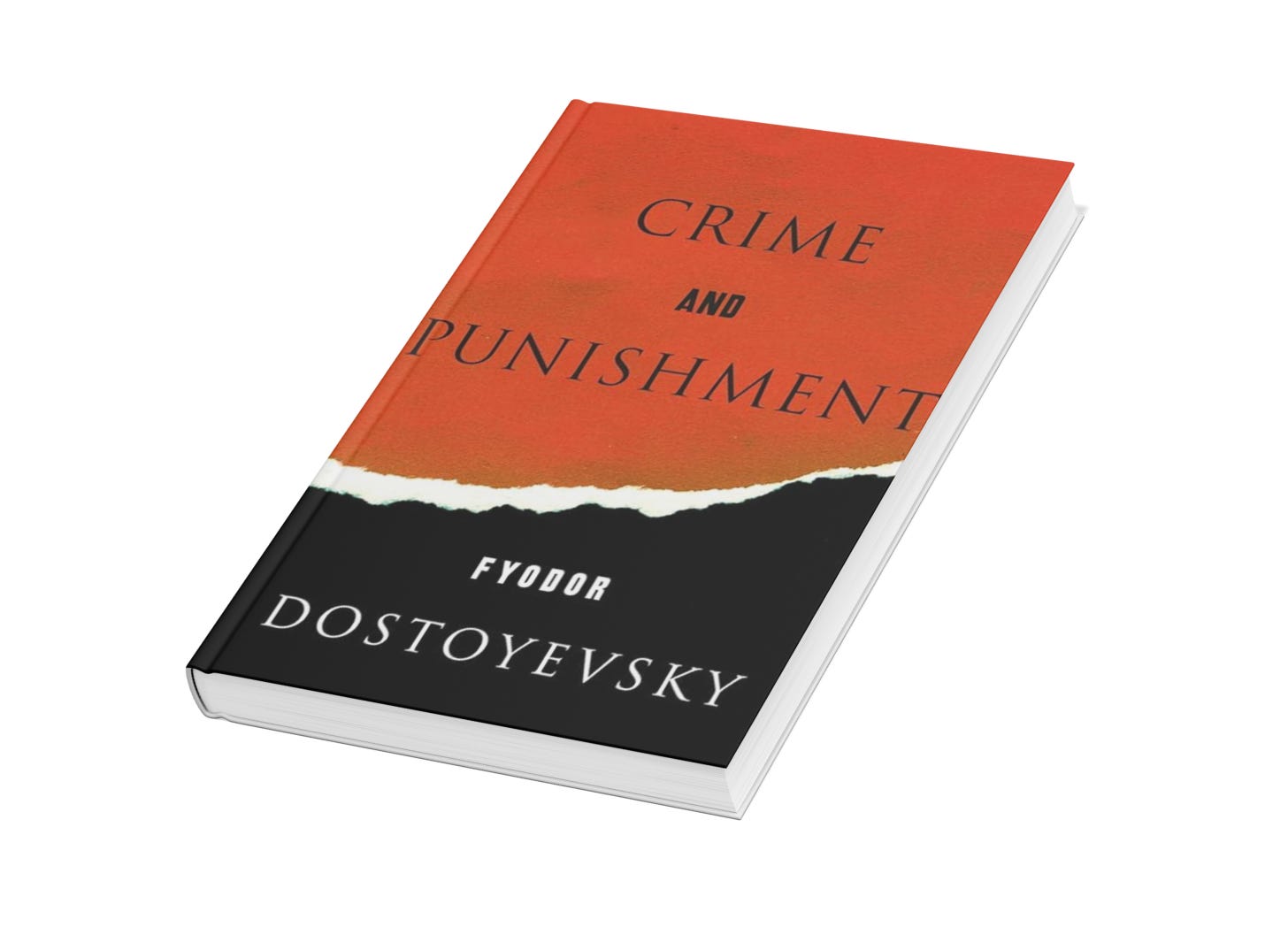How to Build Anchors Before Life Forces You to Need Them
A reflection from Crime and Punishment by Fyodor Dostoevsky
Hej! It’s William!
This is part of the "Meller Highlights" series with reflections and learnings from my personal book highlights. I read a lot of books, and as a way of giving more value to my paid subscribers, I now share great book lessons specially for them.
If you’ve been following along and enjoying the ideas I share, I’d love to have you join them. Becoming a premium subscriber not only gives you full access, but it also helps me keep creating and going deeper with the work I do.
How do these highlights work?
Every day, I pick one idea from my reading and think about how to apply it in real life. Most stay as private notes, but once a week, I choose one that feels special.
That’s the one I share here, a highlight that turns into a deeper reflection on how it can change the way we do something.
Today’s highlight: Crime and Punishment by Fyodor Dostoevsky
“… Do you understand, sir, do you understand what it means when you have absolutely nowhere to turn?" Marmeladov’s question came suddenly into his mind, "for every man must have somewhere to turn...”
The first time I read it, I simply nodded, as if it were obvious that everyone needs a place to go.
Then I kept circling back, and each time it grew heavier. Because this is not the kind of line that lives comfortably on the page, it drags you into an image you would rather not see.
Nowhere to turn means exactly that: no person to call, no community, no ritual, no belief still strong enough to hold you steady.
Only the silence of isolation. If you have ever even touched the edge of that feeling, you know it is not literature at all, it is survival.
We live in a time that loves independence. Strength is framed as standing tall without leaning on anyone, leaders are praised for never asking help, friends are admired for never needing favors, professionals are celebrated when they carry impossible loads without complaint.
At first glance, this looks like power, yet it is actually fragile because nobody holds forever without leaning.
The moment life cuts deep enough, the pose collapses and the same independence that looked admirable turns out to be the very thing that breaks us.
Book Highlights are part of the premium section of this publication for paid subscribers. This week, you’re getting this one for free.
By upgrading now, you’ll open the door to the full library and every new highlight that’s on the way.
Dostoyevski understood this well. His characters rarely speak from comfort. They speak from misery, from despair, from the edge of losing everything. Marmeladov’s words are not a philosophical idea tested in theory, they are a description of what it feels like to be stripped of anchors. That is why they stay in the mind long after you close the book.
When I sit with this line I cannot help asking myself where do I turn. For me it shifts over time. Sometimes I turn to family, where conversations that look ordinary on the surface carry a hidden strength.
Sometimes I turn to small rituals, like reading early in the morning before the world wakes up or writing late at night when the house is quiet, because those little practices remind me that I am not drifting without direction.
These anchors are not always dramatic, but they keep me steady.
The darker question is what happens when they vanish.
Family can be far away, rituals can lose their meaning when routine swallows them. And if that happens, how long before the ground gives way under me?
We rarely prepare for that possibility because we like to believe our anchors are permanent, but life has a way of teaching otherwise. A job disappears, and the identity tied to it dissolves overnight. A close friend moves away, and the conversations you thought would last forever stop. A belief that once held you begins to feel hollow and distant. Suddenly you find yourself reading Marmeladov not as fiction but as mirror.
I have seen the same truth at work. Teams that see asking for help as weakness often drown in silence. Leaders who believe their role is to carry the weight alone eventually collapse behind closed doors. I remember projects where the plan was fine, resources were fine, yet the real failure was the silence of people who refused to admit the load was too heavy. By the time they finally turned, the damage had already spread.
What makes this ironic is how much we talk about connection today. Networks, communities, collaboration tools, endless channels of communication. Yet behind all of this, the pressure to be fine on your own is stronger than ever.
So people collapse quietly, not because they are fragile, but because they were told leaning is weakness.
Dostoyevski’s warning is not complex. Independence turns dangerous the moment it isolates you. Real strength is not about standing untouched; it is about knowing in advance where you will go when the weight exceeds what you can carry.
When I try to make sense of this, I think of football. The player who insists on keeping the ball, refusing to pass, might look impressive for a short moment, but eventually, he is trapped with no way out. He loses the ball, and the team collapses around him. The failure is not in a lack of talent; it is in not having anywhere to turn. Life is much the same; if you cannot pass the weight, you will be trapped sooner or later.
Or take Churchill. We remember him as the voice who held Britain together in 1940, a solitary figure in myth. Yet in reality, he was constantly turning to his cabinet, to allies, to the stubborn spirit of ordinary people. His speeches mattered because they leaned on something larger than him. He knew he was not standing alone, and that knowledge was part of his strength.
For us, the lesson is clear. Build anchors, and more than one.
A person, a community, a belief, a ritual. Do not assume one will last forever, because when it disappears, you will be left exposed. And if you are leading, create an environment where others can turn without shame.
Because when they feel they cannot, they collapse in silence, and silent collapse is always harder to repair than an honest request for help.
Modern voices tell us to be fine alone. Dostoyevski whispers across time that every person must have somewhere to turn.
That is not weakness, it is the condition for survival.
So here is the question I keep circling around, and I leave it with you now. If everything else collapsed tomorrow, where would you turn? Not the easy answer, the real one. The place, the person, the practice, the meaning that would still hold you when nothing else does.
The time to know that is not when despair arrives. The time is now.
This is part of the "Meller Highlights" series with reflections from my personal book highlights.





So right, we all need someone to turn to, my advice to everyone is to build and support your family, I have four married daughters and seven grandchildren and a step-great grandson. I know I can turn to them.
Thanks William. This is a great exploration of the book. It's been a while since I read Crime & Punishment, but I also think that part of Dostoyevski's message was that the real punishment for Rodion was the continued isolation that he insisted (in part) bringing on himself. I need to re-read it again soon, but I also remember feeling it was an incredibly tactile book, one in which I could almost feel the grime... 🙏